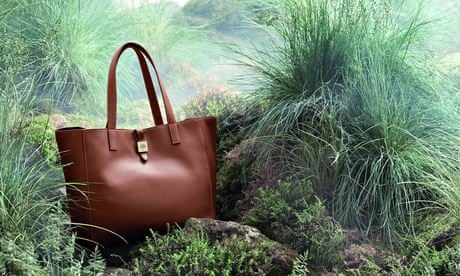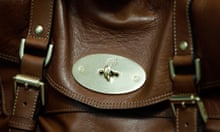The boss of Mulberry has admitted that turning around the troubled British handbag maker would be a "two year project" after an aggressive move upmarket triggered a slump in sales and annual profits.
With sales at its stores in freefall, the company's executive chairman, Godfrey Davis said it would take time to win back British shoppers who were alienated by the Somerset brand's change of direction. "This is a medium term project," he said. "We have been dealing with inherited issues but we are making progress and expect to see some of the benefits coming through in the second half (of the financial year) and more next year."
Davis is clearing up the mess left behind by Bruno Guillon, the French chief executive ousted in March. Guillon had sought to propel the brand into the luxury elite alongside the likes of Prada and Gucci by selling bags that cost over £1,000, rather than the cheaper ones that were in saving up distance of many British customers. The gung-ho approach backfired, with the company forced to issue a series of profits warnings as sales dried up in the important middle market.
The annual results revealed Guillon, a former Hermès executive, received a £648,000 pay off.
Sales had collapsed, Davis said, because Mulberry had lacked "new and interesting" products in the key £500 to £800 price range. "The evidence is this sort of price point is important globally," he said.
Like rivals Louis Vuitton and Gucci, Mulberry is struggling to compete against more accessible, trendy fashion brands such as Michael Kors, which give customers the look and feel of luxury at a fraction of the price. The Mulberry design team has turned its attention to this area and last month saw the launch of the new Tessie range, which with a small satchel priced at £495 and a tote costing £595, is "proving popular" according to Davis. Other initiatives include a collaboration with model Cara Delevingne which feature a bag inspired by her lion tattoo.
It remains early days, though, with like-for-like sales down 15% in the last 10 weeks. In a "sale" on the Mulberry website, prices have been slashed to £770 from £1,100 for many classic Bayswater, Alexa and Del Rey bags.
The company said recruiting a creative director to replace the highly regarded Emma Hill, who quit last year, was a priority. "Once we have settled the creative director appointment we will look for a new chief executive," Davis said. Hill is credited with some of its bestselling bag designs such as the Alexa – a satchel named after presenter Alexa Chung – and the Del Rey, dedicated to singer Lana Del Rey – and it has struggled in her absence. Erdem, Roland Mouret, Mary Katrantzou and Sophie Hulme are among the fashion designers linked to the role in the fashion press.
Warwick business school professor Qing Wang said last year's move upmarket "appeared not to have been thought through". He said: "It seems to me that the management of Mulberry failed to understand that even with the right ingredients that Mulberry possesses such as fine material, craftsmanship and a 'made in Britain' label, the making of a true luxury good requires time and process to distil. The latest knee-jerk reaction to reduce prices will only add to the confusion in the mind of the consumers of the company's brand image as to whether it's an affordable luxury like Coach or an exclusive luxury like Burberry."
Created in 1971 in Somerset, Mulberry is named after the tree which founder Roger Saul walked past each day in the grounds of his school. Davis said the brand, which is now 56% owned by Singapore billionaires Christina Ong and Ong Beng Seng, still stood for "modern Englishness" and that it was going back to its roots of providing people with "everyday, practical and beautiful things". It was possible, he said to appeal to both the middle classes and the super rich, with a Paris flagship shop set to open next year.
Davis admitted in April that introducing cheaper bags would hit sales and profits in the short term, but insisted this was necessary to revive the Mulberry brand. Profits crashed to £14m in the year to 31 March from £26m the previous year, partly caused by costs related to opening nine new international stores. The company also built a second UK factory last June where it created 320 new jobs. The shares closed up 3% at £7.30.









Comments (…)
Sign in or create your Guardian account to join the discussion